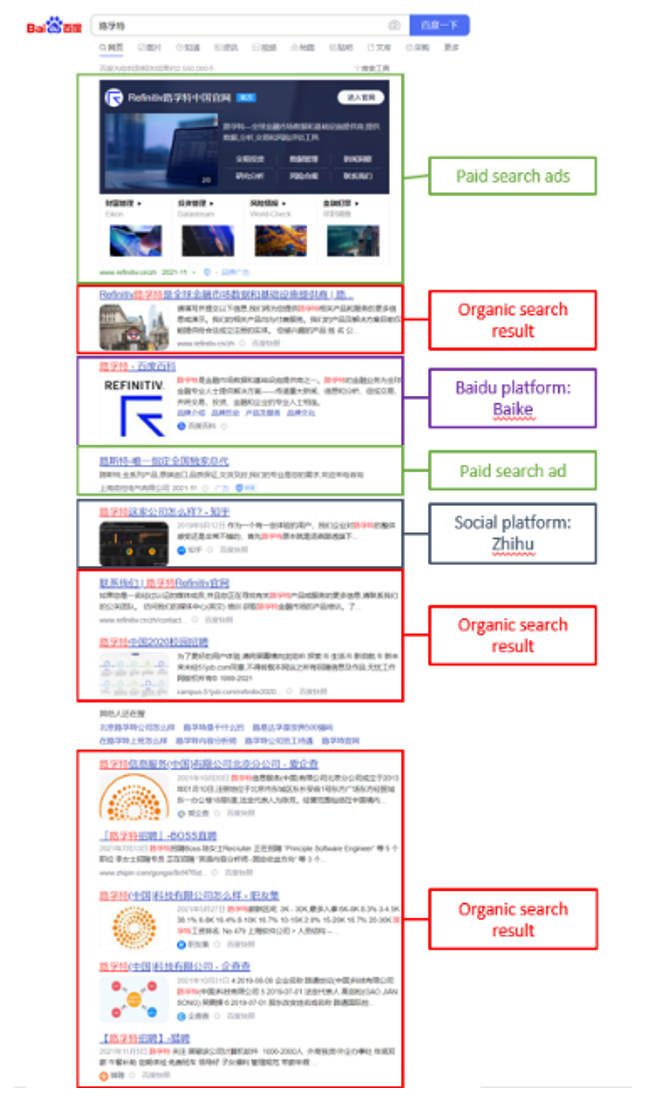B2B Content Marketing in China: How to Choose the Right Platform?
Understanding how to tap into China’s massive and hyper-lucrative market—which is, in fact, the world’s fastest growing economy—has become critical for international B2B brands.
The driver behind this staggering growth? The proliferation of companies embracing digital technologies and the latest marketing trends to engage China’s 989+ million internet users, who make up some of the world’s most engaged and sophisticated B2B buyers.
But they don’t use the likes of Google, Facebook, or LinkedIn—all platforms most of the world associates with B2B content marketing. Instead, standing out in China not only calls for localization across the region’s diversity but also a strong presence on local B2B platforms—like Baidu and Zhihu—that fit your brand and goals.
Here, we’ve outlined crucial considerations for choosing the right platforms for B2B content marketing in China so that you can reach your target audience and, in turn, increase your conversion rate.
But before we do, let’s recap some critical best practices for your B2B content marketing.
B2B Content Marketing: Best Practices
While interpretations of B2B marketing best practices can vary across different companies and industries, here are some things to bear in mind:
- B2B marketing can attract and funnel quality leads for a business.
- For maximum ROI, it’s ideal to align your B2B marketing with your sales efforts, working in tandem to nurture leads.
- As part of your localization strategy, you should produce B2B content in the local language of your target audience: In this case, Simplified Chinese but across varying regional dialects and cultures.
With that said, let’s uncover how to choose the right platform to get the most out of your B2B content marketing in China.
WANT DIGITAL INSIGHTS STRAIGHT TO YOUR INBOX?
The Best Platforms for B2B Content Marketing in China
Top Search Engine for B2B Content Marketing in China: Baidu
Occupying over 74% of China’s search market, Baidu is China’s #1 search engine and has become as synonymous with search in China as Google is in other markets. But unlike Google, Baidu has more ads and result sections packed into its search engine results pages (SERPs), with higher exposure of its native properties:
- Up to five ads are shown above and below the organic results section on Baidu’s SERP.
- Baidu-owned properties typically occupy up to 70% of the first SERP. This is because Baidu’s algorithm favors results from its own properties.
To visualize this, check out Baidu’s SERP for a search of the B2B company “路孚特” (Refinitiv):
Baidu’s SERP: “路孚特” (Refinitiv)
The paid ads section for the term “路孚特” (Refinitiv) occupies virtually all the SERP real estate above the fold, with only two organic results—one of which is from Baike, Baidu’s online encyclopedia—sandwiched in-between. In third is a result from the local social platform, Zhihu, followed by the rest of the organic results.
So, in addition to its search function, Baidu offers several native properties and tends to circulate traffic internally by promoting its own content higher on the SERP. Thus, if you only optimize your site for Baidu the search engine, you risk losing out to other Baidu-owned properties or authoritative third-party platforms that will likely rank higher for your target keywords.
Instead, you should use Baidu as a launchpad, keeping in mind your brand isn’t limited to just your website but can permeate multiple online mediums at once.
Pro tip: Diversify your content portfolio to better leverage the ranking potential of Baidu’s properties and appear across its SERP opportunities.
However, note that Baidu and its properties are highly moderated and prohibit the disclosure of private information as per China’s new personal information protection law. As such, ensure that your content adheres to relevant regulations so that it can be approved and served to your target audience.
Here, let’s look at three Baidu properties for B2B exposure in China.
Baidu Baike
Baidu Baike, China’s Wikipedia equivalent, is highly popular among Baidu users as an authoritative source of information and continually ranks high on Baidu’s SERP (i.e., among the top five results) for searches on brands, people, places, and much more.
Ultimately, a Baidu Baike page can amplify your brand image, increase online visibility, and strengthen trust with your target audience: If there’s an entry within Baike related to a search query, then Baidu will serve the Baike article first.
How to Create Content for Baidu Baike?
Baidu Baike is highly authoritative so content should follow suit by being informative, objective, and up-to-date. You can further reinforce your credibility by keeping to a professional tone of voice.
In addition, avoid self-promotion or creating content that violates Baidu Baike’s editorial policy, including violent, unethical, spam-heavy content. Baidu also prohibits the disclosure of private information like phone numbers, email addresses, and even website URLs.
Baidu Zhidao
Baidu Zhidao (meaning “Baidu knows”) is the Baidu equivalent of Yahoo! Answers and is another Baidu property that ranks favorably on Baidu’s SERP—typically as the first result. Its launch in 2005 also makes it one of the oldest Q&A community platforms, where over 580 million questions—from everyday know-how to business inquiries—have been answered. This makes the content you publish on Baidu Zhidao ideal for driving traffic from target keywords.
How to Create Content for Baidu Zhidao?
Before creating content on Baidu Zhidao, we advise researching frequently asked questions (FAQs) on the platform that are most relevant to your business.
With this knowledge, you can curate content that comprehensively answers those questions, with the underlying goal of getting upvoted by users since the highest-rated response usually ranks first. And unlike Baidu Baike, Baidu Zhidao’s content is largely user-generated so it’s advisable to write your entries in a casual tone of voice to resonate with its audiences.
Baidu Baijiahao
Baijiahao is Baidu’s content- and information-sharing platform where publishers post content ranging from videos to text articles to livestreams, with news and entertainment being among the most prominent topics. And its volume is increasing continuously: As of 2021, it hosted 4.2 million publishers, a staggering 42% YoY increase.
Not only does Baidu Baijiahao rank favorably on Baidu’s SERP, but its integration with Baidu’s app and search functions make for a seamless search experience for users. Another advantage of the platform is that uploaded content can be shared across popular Chinese social platforms outside of Baidu, including Weibo, WeChat, and QQ.
So, given its high SERP visibility, seamless integration with Baidu’s ecosystem, and connectivity with third-party social platforms, Baidu Baijiahao is arguably one of the best tools for brand promotion in China.
How to Create Content for Baidu Baijiahao?
To post content on Baidu Baijiahao, you must first have a Baijiahao business account, which involves selecting your business category and submitting your identity documents, Mainland Chinese business license, and local phone number for approval. Again, note that only businesses registered in China are eligible for a Baidu Baijiahao account.
Most Baijiahao users prefer long-form content, so ensure yours is in-depth, engaging, and original. Simultaneously, optimize the reading experience by breaking up long content with easy-to-follow headings and attractive images.
To optimize the content, you can leverage China SEO tools like Dragon Metrics to facilitate content ideation and identify search trends by uncovering Simplified Chinese keywords that your target users are searching for.
Top Social Platform for B2B Content Marketing in China: Zhihu
Zhihu
Zhihu (meaning “do you know?”) is China’s equivalent of Quora and is the largest Q&A platform in China with over 94.3 million active users in 2021. And unlike many other social platforms, Zhihu is committed to cultivating an authoritative Q&A and knowledge-sharing platform. Here’s an overview on the platform’s user demographics:
- Zhihu’s userbase comprises a mature demographic, where 78.2% are 25 years old or older.
- Zhihu users are predominantly well-educated, with 80% holding at least a bachelor’s degree, according to an iResearch report.
- Zhihu users are relatively affluent, with 30% earning more than RMB ¥10,000 per month compared to the average monthly salary of RMB ¥2,000 to RMB ¥$5,000 per month for most internet users in China. Moreover, 40% of Zhihu users live in first- and second-tier Chinese cities.
How to Create Content for Zhihu?
To post content on Zhihu, you must register for a business account—only open to companies registered within China—and go through its signup and verification process. But note that Zhihu’s verification process can be stringent as it is committed to weeding out content that could misinform or negatively affect users.
After getting verified by Zhihu, you can begin publishing content and engaging with its users. Educational and well-researched content is a great way to demonstrate your industry expertise and build brand awareness among Zhihu’s relatively mature audience. And because Zhihu often ranks higher than third-party websites on Baidu’s SERPs, it is best practice to optimize your Zhihu content around keyword themes to maximize your reach.
***
While tailoring your content to your audience’s needs and behaviors is key to B2B marketing anywhere around the world, success in China hinges on leveraging the right platforms—and, in turn, optimizing your content for those platforms—to stand out in its ultra-competitive digital environment.







